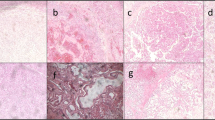Abstract
Mutations inras oncogenes and expression of their encoded p21 protein products are believed to play an important role in carcinogenesis in humans. Detection of mutant p21 proteins in serum may be a useful molecular epidemiologic biomarker with which to study this process, and workers with heavy exposure to vinyl chloride (VC) represent a model population for such study. We studied the occurrence of a specificras mutation (Asp 13 c-Ki-ras) by oligonucleotide hybridization and the expression of the corresponding p21 protein in tumor tissue and serum by immunohistochemistry and immunoblotting with monoclonal antibodies in five individuals with heavy exposure to VC and resultant angiosarcomas of the liver (ASL). Four of five (80 percent) of the cases of ASL were found to contain the mutation and to express the corresponding mutant protein in their tumor tissue and serum. Serum expression of the mutant protein also was examined in nine VC-exposed workers with liver angiomas and 45 VC-exposed workers with no evidence of liver neoplasia; eight of nine (89 percent) of the former and 22 of 45 (49 percent) of the latter were also positive for the mutant p21 in their serum. However, serum immunoblotting results for 28 age-gender-race matched, unexposed controls were all negative. Stratification by years of VC exposure showed a significant linear trend (P<10−5) for the occurrence of the serum mutant p21 protein with increasing duration of exposure. These results suggest that detection of serum mutant p21 protein can be a valid surrogate forras gene expression at the tissue level. Further, serum mutant p21 may be a useful molecular epidemiologic biomarker for the study of chemical carcinogenesis in humans exposed to VC and possibly for the study of other mutantras-related human cancers.
Similar content being viewed by others
References
Barbacid M. ras genes.Ann Rev Biochem 1987;56: 779–827.
Balmain A, Brown K. Oncogene activation in chemical carcinogenesis.Adv Cancer Res 1988;51: 147–82.
Doll R. Effects of exposure to vinyl chloride: an assessment of the evidence.Scand J Work Environ Health 1988;14: 61–78.
Marion MJ, Froment O, Trepo C. Activation of Ki-ras gene by point mutation in human liver angiosarcoma associated with vinyl chloride exposure.Mol Carcinog 1991;4: 450–4.
LaVecchio JA, Hamer PJ, Ng SC, Trimpe KL, Carney WP. Characterization of monoclonal antibodies specific to the activated ras p21 with aspartic acid at position 13.Oncogene 1990;5: 1173–8.
Brandt-Rauf PW. Oncogene proteins as biomarkers in the molecular epidemiology of occupational carcinogenesis: the example of the ras oncogene encoded p21 protein.Int Arch Occup Environ Health 1991;63: 1–8.
Luo JC, Neugut AI, Nieves J, Benson M, Niman H. Brandt-Rauf PW. int-l related protein in serum of prostate cancer patients and controls.Med Sci Res 1991;19: 453–4.
Shimizu K, Birnbaum D, Ruley MA, et al. Structure of the Ki-ras gene of the human lung carcinoma cell line Calu-I.Nature 1983;304: 497–500.
McCoy MS, Bargmann CI, Weinberg RA. Human colon carcinoma Ki-ras2 oncogene and its corresponding proto-oncogene.Mol Cell Biol 1984;4: 1577–82.
Kozma SC, Bogaard ME, Buser K, et al. The human c-Kirsten ras gene is activated by a novel mutation in codon 13 in the breast carcinoma cell line MDA-MB231.Nucleic Acids Res 1987;15: 5963–71.
DeVivo I, Breuer B, Smith S, et al. The detection of c-myc oncoprotein in cancer patients by immunoblot.Med Sci Res 1993;21: 345–7.
Kahn SM, Jiang W, Culbertson TA, et al. Rapid and sensitive non-radioactive detection of mutant K-ras genes via enriched PCR amplification.Oncogene 1991;6: 1079–83.
de Gunzburg J, Riehl R, Weinberg RA. Identification of a protein associated with p21 ras by chemical crosslinking.Proc Natl Acad Sci USA 1989;86: 4007–11.
Brandt-Rauf PW, Smith S, Hemminki K, et al. Serum onco-proteins and growth factors in asbestosis and silicosis patients.Int J Cancer 1992;50: 881–5.
Maltoni C, Lefemine G, Ciliberti A, Cotti G, Carretti D.Experimental Research on Vinyl Chloride Carcinogenesis. Princeton, NJ, USA: Princeton Scientific Publishers, 1984.
Fox AJ, Collier PF. Mortality experience of workers exposed to vinyl chloride monomer in the manufacture of polyvinyl chloride in Great Britain.Br J Ind Med 1977;34: 1–10.
Heldaas SS, Langard SL, Anderson A. Incidence of cancer among vinyl chloride and polyvinyl chloride workers.Br J Ind Med 1984;41: 25–30.
Vogelstein B, Fearon ER, Hamilton SR, et al. Genetic alterations during colorectal-tumor development.N Engl J Med 1988;319: 525–32.
Liu E, Hjelle B, Morgan R, Hecht F, Bishop JM. Mutations of the Kirsten-ras proto-oncogene in human preleukaemia.Nature 1987;330: 186–8.
Author information
Authors and Affiliations
Additional information
This work was supported by the US National Institute for Occupational Safety and Health, US Environmental Protection Agency, US National Cancer Institute, E.I. DuPont de Nemours & Co., American Cancer Society, Lucille P. Markey Charitable Trust, US National Institutes of Health, Association pour le Recherche sur le Cancer, and le Groupment de Enterprises Francaises pour les Lutte contre le Cancer.
Rights and permissions
About this article
Cite this article
De Vivo, I., Marion, MJ., Smith, S.J. et al. Mutant c-Ki-ras p21 protein in chemical carcinogenesis in humans exposed to vinyl chloride. Cancer Causes Control 5, 273–278 (1994). https://doi.org/10.1007/BF01830248
Received:
Accepted:
Issue Date:
DOI: https://doi.org/10.1007/BF01830248




